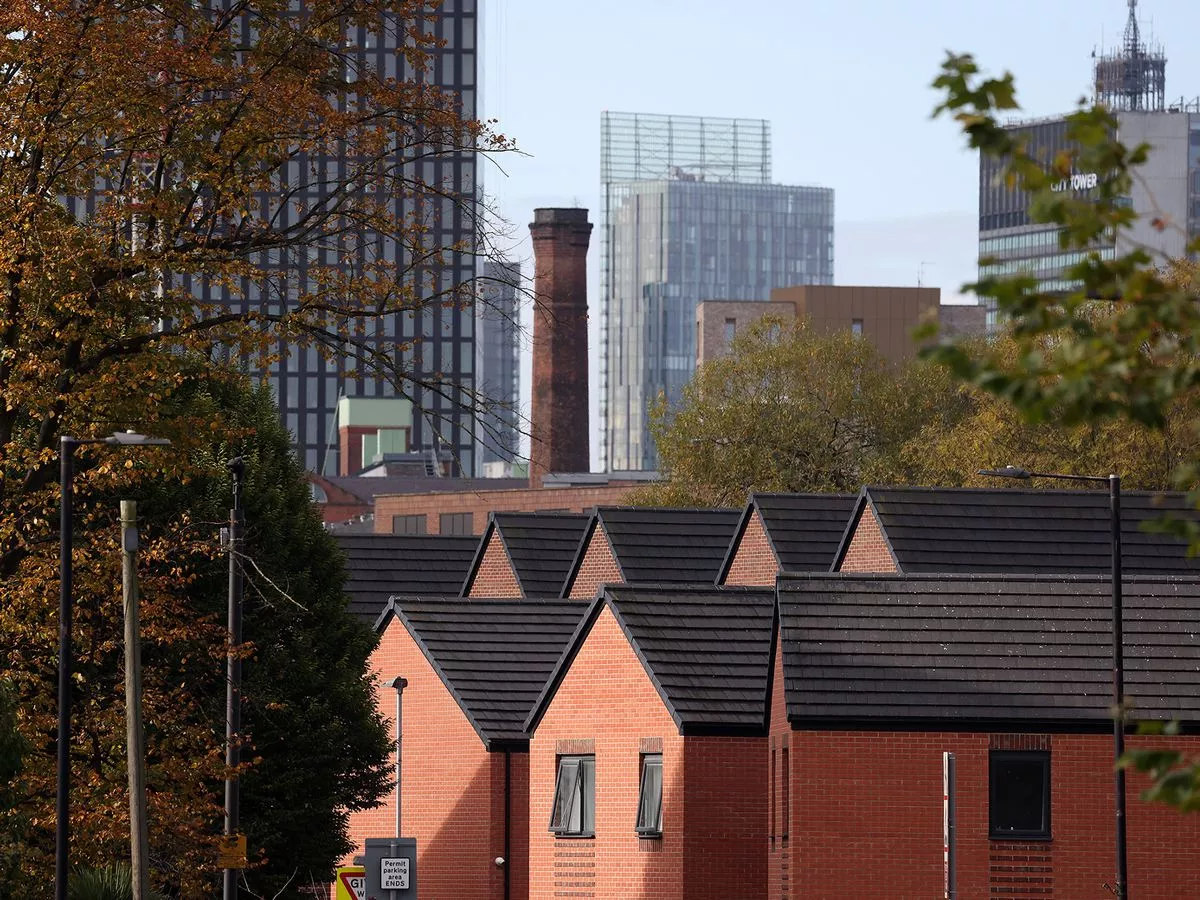Copyright manchestereveningnews

In a matter of hours, millions of people saw their rights to a safe and secure home strengthened - at least in principle. As Monday (October 27) began, Awaab's Law became a reality. Social landlords, including councils and housing associations, now have strict timeframes to inspect and repair emergency health hazards like damp and mould. The new legislation is named after Awaab Ishak , the two-year-old boy who died following prolonged exposure to mould at a flat on Rochdale's Freehold estate in 2020. It was followed by news of the long-awaited Renters' Rights Bill receiving Royal Assent on Monday evening, to become an Act of Parliament. Join the Manchester Evening News WhatsApp group HERE Through that piece of legislation, Awaab's Law will be extended to the private rented sector, while a raft of other measures are also being introduced to support tenants - including the banning of Section 21 'no-fault' evictions. But while both moves were celebrated by the Labour government and welcomed by campaigners, there are now big question marks surrounding what happens next for both tenants and landlords. Almost three years since the campaign for Awaab's Law began, the new legislation came into force for the four million households living in social housing across England. The first phase means social landlords now have strict timeframes to inspect and repair emergency hazards such as damp and mould, gas leaks, broken boilers and loss of water supply. In the worst cases, repairs will need to be carried out within 24 hours or alternative accommodation should be provided - and social landlords who fail to comply can ultimately be taken to court. Further health and safety hazards will be added to Awaab's Law in two further phases over the next two years. Meanwhile, a second major housing announcement was made on Monday evening, affecting 11 million people across England who rent in the private sector. The long-awaited Renters' Rights Bill - which was first proposed by the Theresa May government in April 2019 - finally became an Act of Parliament, having been signed off by the King at 7.40pm. The current Labour administration says the new law will 'rebalance landlord-tenant relations across England'. It will abolish Section 21 'no-fault' evictions, a move that the government hopes will empower tenants to challenge poor housing conditions without fear of being kicked out in retaliation. The new law also gives renters the right to end their tenancies with two months' notice, while 'bidding wars' for rental properties will be banned and landlords will be unable to ask for more than one month's rent upfront. Tenants will also be able to challenge rent increases deemed unfair, while landlords will no longer be able to refuse tenants who have children or receive benefits, and - crucially - Awaab's Law will be extended from the social sector, to the private sector. “Every family deserves the dignity of a safe and secure home," said Prime Minister Sir Keir Starmer on Monday evening. “For too long, millions of renters have lived at the mercy of rogue landlords or insecure contracts, with their futures hanging in the balance. We’re putting an end to that. “A secure home isn’t just bricks and mortar – it’s the foundation for opportunity, safety, and a better life. No child should grow up without one.” While the new legislation has been welcomed by campaign groups, attention is now turning to how the new laws are implemented. The Ministry for Housing, Communities and Local Government says ministers will outline how the new reforms will be rolled out 'in the coming weeks'. It is expected that the ban on Section 21 evictions will be among the first measures to be imposed, but some other reforms will follow later. The Manchester Evening News understands the department is considering how best to apply Awaab's Law to the private sector in a way that is fair, proportionate and effective for both tenants and landlords, with a consultation expected to take place. The legislation carrying Awaab's Law in social housing was passed by Parliament in summer 2023, but it took more than two years before tenants were finally able to benefit, including a consultation in early 2024. Christian Weaver, the barrister who has represented Awaab's family since the toddler's case went to Rochdale coroner's court, has called for urgency in extending the new legislation to the private sector. "These issues aren't exclusive to the social rented sector," he said. "When Awaab's family were campaigning for Awaab's Law, it was with the appreciation that those in private rented accommodation could meet the exact same fate that they sadly did. "With the Awaab's Law in social housing, there's a phased approach now, and we are concerned that the process hasn't even started in the private sector yet, so it could still be a number of years before a fully functioning Awaab's Law is there. "It's really important that pressure isn't let off, that we continue to push for an Awaab's Law that truly protects all tenants." The planned changes are the result of several years of hard work from a raft of organisations who make up the Renters' Reform Coalition, during a campaign that faced 'stiff opposition at various points', according to director Tom Darling. Ben Twomey, chief executive of Generation Rent, has called on the government to 'now give clarity to renters and landlords by announcing an implementation date quickly'. Mairi MacRae, director of policy and campaigns at Shelter, told the M.E.N.: "The Renters’ Rights Act is the victory of a lifetime for renters who have fought for years for better protections. "England’s 11 million renters will finally be unshackled from the gross injustice of no fault evictions, and empowered to call out poor conditions without fear of losing their home. "But these landmark changes won’t become a reality until the government sets a date to bring them into force. "Once these laws are implemented renters will finally have certainty that an unjust eviction notice isn’t about to drop through their letterbox. Until then, we will be doing everything we can to help tenants understand their upcoming new rights." Housing secretary Steve Reed hailed the Renters' Rights Act as 'the biggest leap forward in renters’ rights in a generation'. "We are finally ending the injustice overseen by previous governments that has left millions living in fear of losing their homes," he said. "For decades, the scales have been tipped against tenants. Now, we’re levelling the playing field between renters and landlords. “We are tearing down the walls of injustice in the private rented sector and building a future where tenants are protected, respected and empowered." But Greater Manchester Tenants Union (GMTU), which supports renters across the region warns that 'weaknesses' in the legislation could be exploited. As a member of the Renters' Reform Coalition, it played a role in campaigning for the changes - but it insists that 'legislation alone is not enough', and that attention should now be focused on how both the Renters' Rights Act and Awaab's Law are delivered and enforced. It is also is urging the government to make an announcement 'immediately' on when the reforms will come into force. A spokesperson for GMTU said: "While many of the reforms in the Act are welcome, significant weaknesses remain: unscrupulous landlords may still exploit loopholes - for example by claiming they need to sell a property or move in themselves - to evict tenants unfairly. "The effective implementation of the Act - especially the creation, scope and usability of the landlord and property database - will be crucial. However, improved rights will only matter if backed by proper enforcement mechanisms and meaningful access to legal redress. "This principle applies equally to Awaab’s Law... our members in Greater Manchester have witnessed a sharp rise in complaints about damp, mould and poor housing conditions in social housing, particularly in the Rochdale area, which leaves us with limited confidence that new legislation alone will bring meaningful change. "The use of the property tribunal to contest unfair rent increases is insufficient: in practice it often only delays rises rather than prevents them. "A truly effective system requires a return to genuine rent controls, not merely adjudication." It's not only tenants' organisations who are calling on the government to provide certainty as soon as possible. Landlords want to see how they will be affected by the new rules, and when those rules will come into force. The National Residential Landlords Association (NRLA) says the new legislation is the 'most significant shake-up of the rental market in almost 40 years'. It has called for 'certainty about the way forward' - while promising to work with government to ensure the measures are introduced 'in a way that is fair, proportionate and deliverable'. Chris Norris, chief policy officer at the NRLA, said: “Now that the Renters’ Rights Act has received royal assent, attention now focuses on how the government will handle its implementation in practice. “At this stage we have little by way of detail on what the implementation phase will look like, so it is imperative that the government acts quickly to provide clarity on how they will, for instance, put in place measures to address lengthy court wait times in possession cases. “Without clear guidance on timeframes and specifics on issues such as this, there is every risk that landlords and tenants will be unable to plan for its arrival.”



